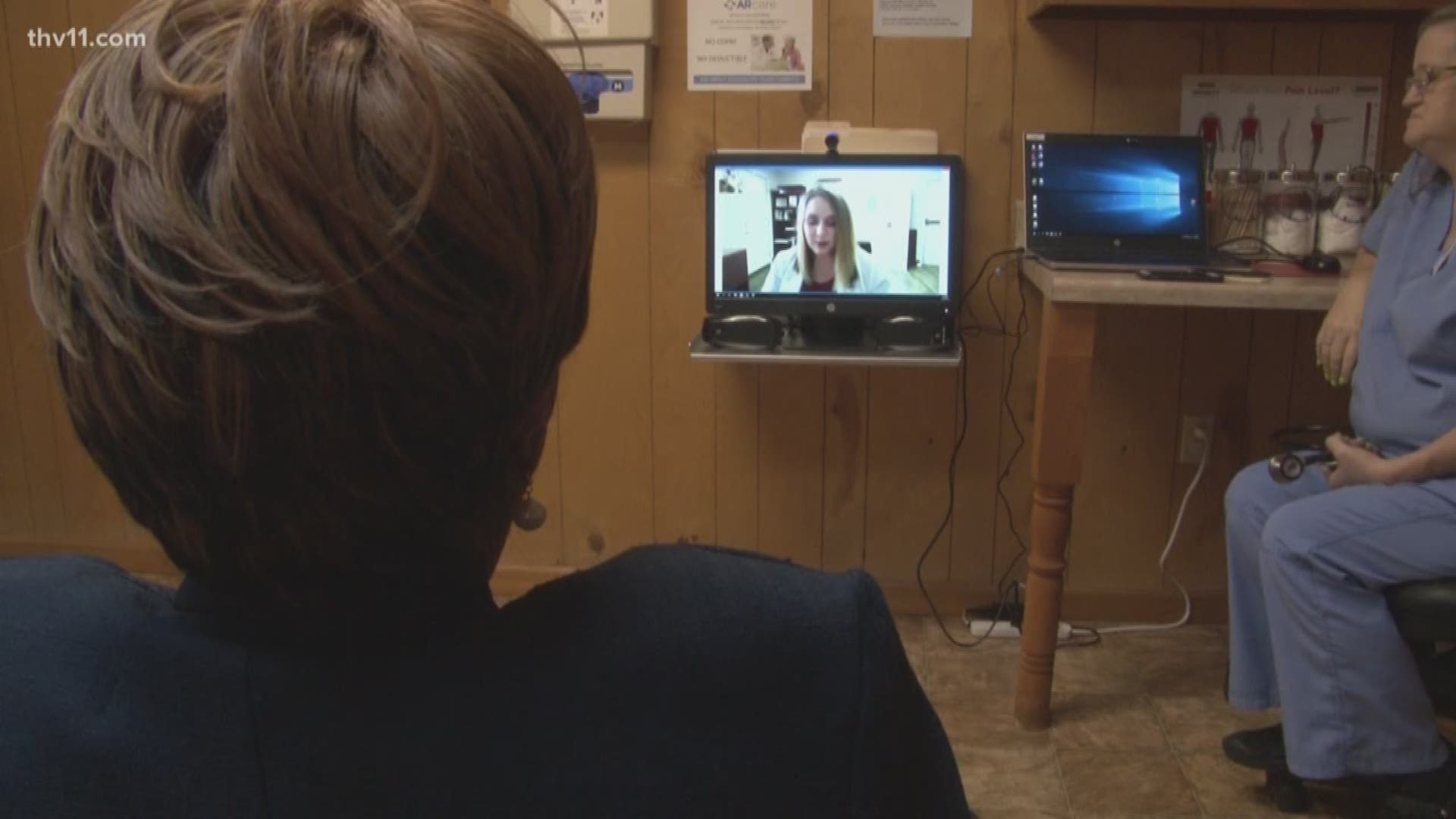A new connection is keeping people healthy in rural communities.
ARcare is bringing telemedicine to parts of the state where patients might not otherwise get to see a doctor.
“At first, I wasn’t negative about it, but I just had some reservations,” ARcare CEO Dr. Stepher Collier said Wednesday. “And I’ve been surprised that the patients just love it, because they love to come to our telehealth clinics.”
Cotton Plant Mayor Clara Harston Brown is one of those patients. She visited the ARcare clinic on Oak Street Wednesday afternoon. While a nurse checked her vitals, an APRN in Swifton analyzed the data and ran the checkup.
“She checks their blood pressure,” Sara Beth Wilcox, the nurse in Swifton, said of her Cotton Plant colleague, “and then she puts in in the computer, and I can see it as soon as she puts it in. When she checks their heart rate and listens to their lungs via stethoscope, it sends it directly to a mobile device that I have where I can listen to that.”
Wilcox watched via a webcam in the exam room, while a camera on her end allowed her to be seen, as well.
“I think it’s great,” Harston Brown said, “because most of the time, people come in, they see the doctor, a lot of the things they wouldn’t say to a doctor in person, they might say over that telecom right there. Cause I had said things over there that I wouldn’t even say to the doctor. I don’t know why there seems to be a difference. It don’t seem as intimate.”
Wilcox said she sees 10-15 patients per day this way. She uses the telemedicine system three days a week to see patients from Cotton Plant, while also working with patients who visit her Swifton clinic 70 miles north.
“There are some difficult things,” she explained. “In case someone complains of abdominal pain, or sometimes joint pain, all we have to rely on are the stethoscope and the camera.”
Collier said ARcare first considered implementing a system like this four years ago, but technology and payment systems were not good enough to make it work. The company tested the current system in schools in Kentucky before rolling it out in four Arkansas towns last fall.
“We had two loss-leader clinics,” Chris Gibson, ARcare’s COO, stated, “and we needed to desperately identify a way to salvage them both. And this has done just that.”
The clinic’s hours were reduced in 2019 because of financial difficulties. Instead of being open five days a week, it was scaled back to two half-days per week.
“And then the demand was here in the community,” Gibson recalled. They said that they need care when they can get care., cause a lot of people here are strapped for transportation, so when they can get a ride to the clinic, they need somebody here. And this telehealth helped bridge that.”
“Ooh, yes. Yes, yes, yes,” Harston Brown said, “because a lot of people around here, we’re mostly a elderly community, and most of our people, you know, don’t have transportation.”
The nearest health care clinics are nine miles away in Brinkley and 22 miles away in McCrory. Harston Brown said many people in her community cannot make that trip. But thanks to the telemedicine setup, the clinic is able to stay open—with a smaller staff—Monday through Friday.
Clint Shackelford, ARcare’s VP of Operations, said the non-profit’s leadership is “elated, obviously. We saw a need, you know, we have patients that don’t have transportation, often walk to our clinics, can’t get the care that they need. And it’s just an extension of all the services that we have to folks that are desperately in need for health care.”
Between primary care visits and consultations with a registered dietician, approximately 200 ARcare patients used the telemedicine system. Collier said the potential for growth is “exponential,” since primary care visits have only been offered since January.
“We would like for that to become a significant part of our practice,” he added.
Telemedicine will not be available in all of ARcare’s clinics, Collier said. Some, such as those in Jonesboro, Conway, and Little Rock, are too busy for it to be feasible.
Harston Brown said anyone concerned about feeling awkward speaking to a doctor or nurse via webcam should give it a try.
“If you don’t come, they can’t see you, but you might as well put your fears and everything away, cause they’re here for a reason,” she said. “And now, you don’t have to worry about them putting their hands on you, touching you, or asking you this, asking you that. You sit here, you can tell them. And that’s the best part about it: they will sit and listen.”
ARcare implemented the system in partnership with UAMS. UAMS helped with some of the technological and payment processes, as well as training for the staff who would use it. Broadband internet access in rural parts of Arkansas is an issue many politicians are currently working to address, but Collier said that has not hindered ARcare so far. “And I think that’s just going to get better,” he added.

